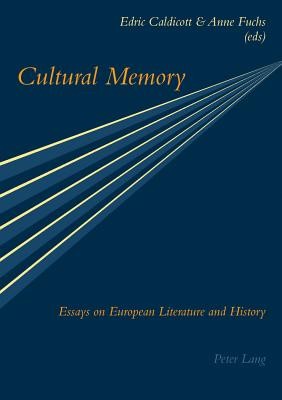
- We will send in 10–14 business days.
- Publisher: Peter Lang UK
- ISBN-10: 303910053X
- ISBN-13: 9783039100538
- Format: 15.2 x 22.9 x 2.2 cm, minkšti viršeliai
- Language: English
- SAVE -10% with code: EXTRA
Cultural Memory; Essays on European Literature and History (e-book) (used book) | bookbook.eu
Reviews
Description
Memory and culture are terms which are now fashionable, if not over-used, but they need careful handling. This book explores their use in a variety of contexts: in European creative writing, in the spheres of national celebration, mourning, and administration of the arts, and in concepts of translation and history. The editors' introduction maps the surrounding theoretical terrain, and each of the following twenty-two essays explores related issues within the specific brief of a local context, whether in France, Germany, Ireland, Italy or Spain, organized under five thematic lines of enquiry: Memory as Counter-History, Narrativity and Remembering, Locating Memory, Remembering and Renewal, Remembering as Trauma.
Coming into prominence after the Holocaust and the fall of European dictatorships, studies in Cultural Memory have been fuelled by the works of Walter Benjamin, Aby Warburg, the rediscovery of Maurice Halbwachs, and more recently by Pierre Nora's notion of 'sites of memory'. Furthermore, they have benefited from the reflections of a range of contemporary theorists in this area, including Paul Ricoeur, Michel de Certeau and Jan Assman. The studies in this volume, however, go beyond the present to show how, in earlier times, the devices of memory and commemoration were exploited both for and against the state. Within the sphere of the present, the expression of memory in narrative is shown to be an essential source of inspiration for the creative writer, discovering renewal in a sense of loss.
EXTRA 10 % discount with code: EXTRA
The promotion ends in 22d.12:45:16
The discount code is valid when purchasing from 10 €. Discounts do not stack.
- Publisher: Peter Lang UK
- ISBN-10: 303910053X
- ISBN-13: 9783039100538
- Format: 15.2 x 22.9 x 2.2 cm, minkšti viršeliai
- Language: English English
Memory and culture are terms which are now fashionable, if not over-used, but they need careful handling. This book explores their use in a variety of contexts: in European creative writing, in the spheres of national celebration, mourning, and administration of the arts, and in concepts of translation and history. The editors' introduction maps the surrounding theoretical terrain, and each of the following twenty-two essays explores related issues within the specific brief of a local context, whether in France, Germany, Ireland, Italy or Spain, organized under five thematic lines of enquiry: Memory as Counter-History, Narrativity and Remembering, Locating Memory, Remembering and Renewal, Remembering as Trauma.
Coming into prominence after the Holocaust and the fall of European dictatorships, studies in Cultural Memory have been fuelled by the works of Walter Benjamin, Aby Warburg, the rediscovery of Maurice Halbwachs, and more recently by Pierre Nora's notion of 'sites of memory'. Furthermore, they have benefited from the reflections of a range of contemporary theorists in this area, including Paul Ricoeur, Michel de Certeau and Jan Assman. The studies in this volume, however, go beyond the present to show how, in earlier times, the devices of memory and commemoration were exploited both for and against the state. Within the sphere of the present, the expression of memory in narrative is shown to be an essential source of inspiration for the creative writer, discovering renewal in a sense of loss.


Reviews